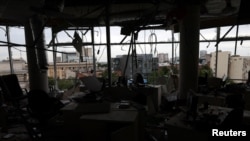Russia launched rocket attacks across Ukraine Saturday morning, mainly targeting military facilities.
The New York Times reports more than 40 rockets were used in the attacks, which the newspaper said were launched from Belarusian airspace just hours before Russian President Vladimir Putin is set to meet with Belarusian President Aleksandr G. Lukashenko in St. Petersburg.
It was not immediately clear if there were any fatalities due to the attacks.
Meanwhile, after weeks of fierce fighting with Russian forces, Ukrainian troops are withdrawing from the eastern city of Sievierodonetsk, according to a regional official.
As the Russians close in on the city, Serhiy Haidai, the head of the Luhansk region’s military administration, said that it “does not make sense” to hold on to what he described as broken positions any longer.
He said troops in Sievierodonetsk had received the order to move to new positions.
Russian advances
Ukraine said Russian forces had fully occupied the neighboring city of Lysychansk in the eastern Luhansk region. Moscow claimed it had encircled about 2,000 Ukrainian troops in the area.
The Russian advances appeared to bring the Kremlin closer to taking full control of Luhansk province, one of Moscow's stated war objectives.
To stabilize the situation in Luhansk, Ukraine needs "fire parity" with Russia, Ukraine's top general told his U.S. counterpart on Friday.
"We discussed the operational situation and the delivery flow of international technical assistance," Ukraine's General Valeriy Zaluzhniy wrote on the Telegram app after a phone call with U.S. Chairman of the Joint Chiefs of Staff, General Mark Milley.
Ukraine has said Russia's artillery advantage on the Donbas front lines is taking a significant toll on Ukrainian troops and has called on its Western partners to supply more weapons to minimize the deficit.
A senior U.S. defense official on Friday praised the Ukrainian decision to withdraw from Sievierodonetsk, describing the move as “professional” and “tactical.”
“What they are doing is putting themselves in a position where they can better defend themselves,” the official told reporters on the condition of anonymity in order to discuss intelligence and other sensitive information.
And while the official said Russian forces have been able to eke out gains around Sievierodonetsk, the gains have come at considerable cost.
“The Russians have suffered heavy casualties and they also have suffered heavy equipment losses,” the official said. “The Russian forces are showing the signs of wear and tear, and debilitated morale, and it is impacting their ability to move forward swiftly.”
US assistance
U.S. officials this week promised the United States will provide $450 million more in security assistance to Ukraine, including more long-range rocket systems, on top of the $1 billion in assistance it announced a week ago.
The senior U.S. defense official said Friday Ukrainian forces are training on the four additional High Mobility Artillery Rocket Systems (HIMARS) that are part of the just announced package, and the U.S.-made systems should be entering the fight in Ukraine in the next several weeks.
With a range of about 70 kilometers, the HIMARS can reach twice as far as other mortar and artillery systems currently at the disposal of the Ukrainian military.
“When you look at the actual distances that the Ukrainians would need to position their systems and the actual positions of the Russians that they are fighting in Donbas, they don't need more than that," the official said. “That range (70 kilometers) will give them significant capability and significant advantage.”
Meanwhile, a car bomb has killed a Moscow-imposed official in Ukraine's southeastern city of Kherson, which is occupied by Russian troops. Dmytro Savluchenko died after his car exploded Friday. He led the Directorate for Family, Youth, and Sports for the city's so-called military and civilian administration established by the occupying forces.
The senior official in the Russian-installed administration of Ukraine’s occupied Kherson region was killed in an apparent assassination, the deputy head of the administration told Reuters. No group has claimed responsibility for the attack.
In Brussels, European leaders met Friday to prepare for further cuts in Russian gas. They also discussed limiting the impact on inflation and seeking alternative supplies, accusing Moscow of "weaponizing" energy via a supply squeeze.
EU bids
On Thursday, the European Parliament voted overwhelmingly to grant European Union candidate status to embattled Ukraine, pushing it one step closer to Western allies who have been supplying it with massive amounts of armaments to help it fight off Russia’s invasion. The vote favoring Ukraine was 529-45, with 14 abstentions.
In a joint televised message to the Ukrainian people, President Volodymyr Zelenskyy compared the EU decision to other historic moments in Ukraine’s history and said the process was irreversible.
“Today, Ukraine is fighting for its freedom and this war began just when Ukraine declared its right to freedom, to choosing its own future,” Zelenskyy said. “We saw [that future] in the European Union.”
Speaker of the Ukrainian parliament Ruslan Stefanchuk called the decision a powerful political message. “It will be heard by soldiers in the trenches, every family that was forced to flee the war abroad, everyone who helps bring our victory closer,” he said.
The European Parliament also approved EU candidacy for Georgia and Moldova.
Some information in this report came from The Associated Press, Reuters and Agence France-Presse. VOA National Security Correspondent Jeff Seldin and Deb Block contributed to this report.








